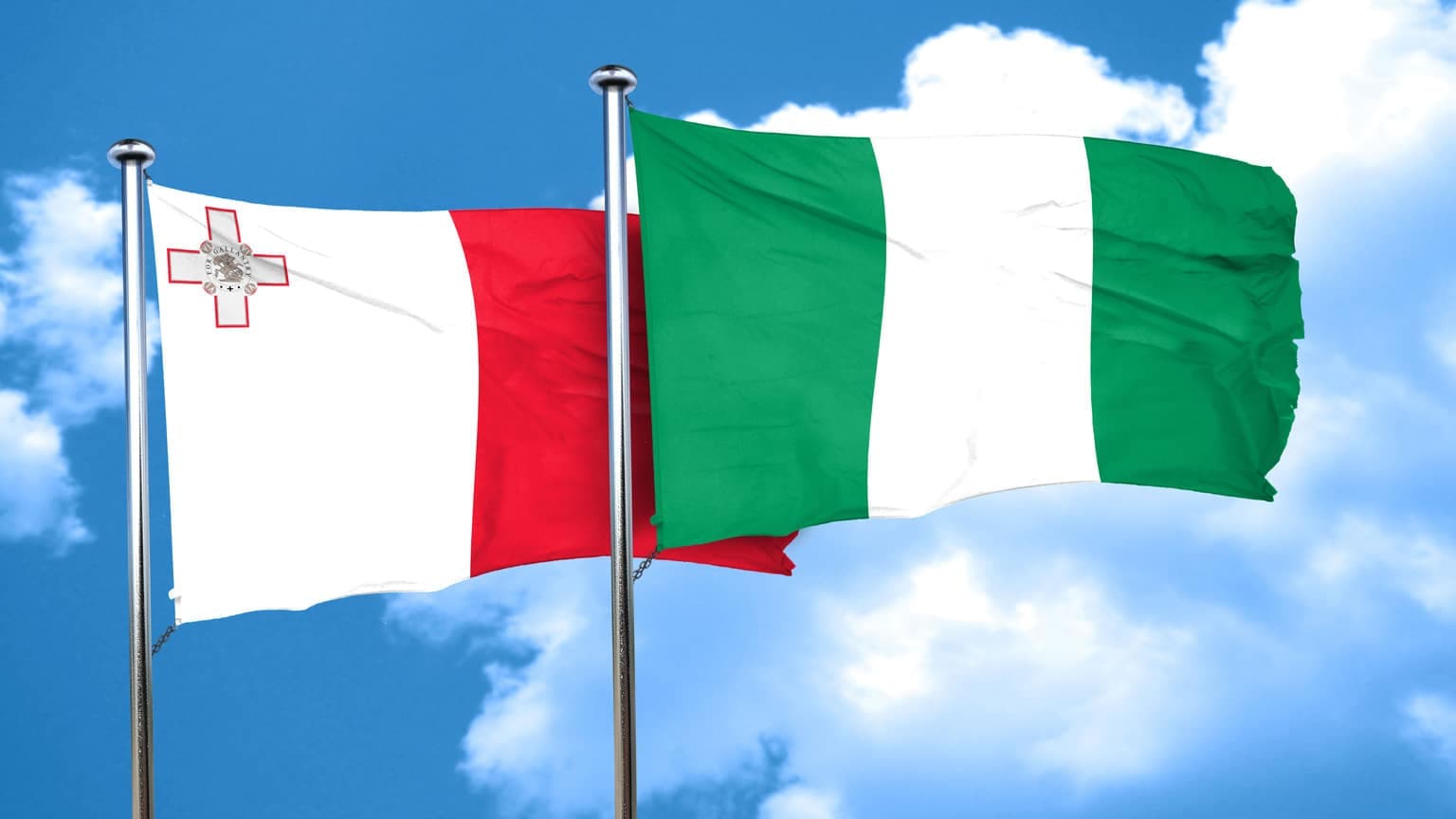Malta Permanent Residence Programme for Nigerians: the ultimate guide
The Malta Permanent Residence Programme is an exclusive opportunity for non-EU nationals, including Nigerians, to acquire a permanent residence permit in Malta and enjoy visa-free travel in the Schengen area of Europe for 90 days in 180.
In this article, we will discuss the benefits of Malta permanent residency for Nigerian citizens, the eligibility criteria, the timeline and process, and what to expect from start to finish.

Told about the requirements and benefits of MPRP for Nigerians
Fact checked byIgor Buglo
Reviewed byVladlena Baranova

Malta Permanent Residence Programme for Nigerians: the ultimate guide
Share:
8 benefits of MPRP for Nigerians
The Malta Permanent Residence Programme is an excellent option for Nigerians to expand global mobility, investment, and business opportunities. The following are some of the main benefits of participating in the MPRP.
1. Life in Malta, a developed European country with a high level of safety and a relatively low cost of living. Most country residents speak English, making integration into society easier for Nigerians.
2. Visa-free travel within the Schengen area, which comprises 29 European countries, including Malta, France, Germany, Switzerland, Austria, Poland, Spain, Sweden, Italy, Greece, Portugal, Netherlands, and many more.
The visa-free stay for Malta residents is up to 90 days out of 180. The time spent in Malta doesn’t count.
3. Safe haven in Malta. With Malta MPRP for Nigerians, you won’t be obliged to live in the country to maintain your permanent residence. If you want, you can create a safe haven with this investment.
An investor can rent or buy property in Malta and open a Maltese bank account to transfer capital to the country. Should there be issues in the state of residence, residents are free to move quickly to Malta.
4. Access to quality education. If you and your children successfully get Malta permanent residency for Nigerians, you’ll no longer need a visa to study in Maltese schools and universities. You can also access educational institutions in the Schengen countries for short-term courses or visit schools and universities before entering them.
5. Access to Malta’s healthcare system. You can turn to Maltese medical facilities for treatment. There are a lot of excellent hospitals and clinics that provide high-quality services. Also, one can use their right to travel to the Schengen Area visa-free to visit clinics in other countries.
6. Running a business in Malta. Permanent residents may establish companies in Malta. The country has a stable economy, a safe banking system, tax incentives for companies, and many attractive business sectors.
Malta permanent residence for running a business in Europe without intermediaries
Ngozi’s company produces and exports cocoa beans, nuts, coconuts, and other foods. He has clients in Europe; he turned to a partner in Germany to work with them. But the partner let Ngozi down several times, leading to a profit loss.
To work with European customers without intermediaries, the businessman decided to get residency in Europe and register a business there. The Malta Permanent Residence Programme suited his goals best.
The investor obtained a Malta PR permit in 11 months. Now he can register a company there and work with European customers directly.
7. Taking advantage of Malta’s tax system. The MPRP does not give applicants special tax incentives. They are to pay the usual tax rates. However, a permanent resident status allows an investor to live in Malta for 183+ days a year, which is necessary to become a country tax resident.
Malta’s tax rates for residents may be attractive to investors and business owners. Additionally, the country has Double Taxation Agreements with 70+ states: they allow residents of Malta not to pay taxes on foreign income at full rates.
8. A life-long residential status in Malta for the whole family. Permanent residence for investors is a life-long status; you will only need to renew your PR cards every five years. Investors may include spouses, children, parents, and grandparents in the applications.
Eligibility requirements of Malta permanent residency for Nigerians
Only investors from countries outside the EU, EEA and Switzerland can take part in the MPRP. Also, one needs to meet the requirements set by the government of Malta; they are designed to ensure that the candidates have no problems with the law and can support themselves while they reside in Malta.
Investor. Here are the essential eligibility requirements for the main applicant:
Over 18 years old.
Clean criminal record. A police certificate is required.
Not under any sanction.
Should be able to confirm the legality of income sources.
No visa denials in countries with a visa-free regime with Malta.
Comprehensive health insurance coverage.
With assets of at least €500,000, including €150,000 of liquid financial assets, or €650,000, where at least €75,000 are liquid financial assets.
A spouse of the main applicant can be added to the programme application. The investor provides documents supporting that the couple is in an officially registered marriage or unregistered partnership. The spouse’s full health insurance coverage is also necessary when applying for Malta residency for Nigerians.
Children. An investor can include children under 18 years old in the MPRP application. One may also bring children over 18 years if they are unmarried and principally dependent on the main applicant or the spouse. Further documentation is required, including their birth certificates and proof of health insurance coverage.
Parents and grandparents can also be supported if they are principally dependent on the applicant or the spouse. The investor provides evidence of your relationship with your parents or grandparents, such as birth certificates.
How much does it cost to obtain Malta permanent residency for Nigerian citizens?
Investors must fulfil certain investment conditions such as buying or renting real estate, making charitable donations, and paying government fees.
Investors choose between renting and buying a real estate property in Malta. For renting, the applicant finds an object for €14,000+ per year. The minimum time of rent is five years.
If purchasing real estate, the minimum property price is €375,000.
Investors hold the property for at least five years after obtaining permanent residence. During this period, renting out the property is possible if it is located in a Special Designated Area (SDA). Once the 5-year span ends, investors decide whether to sell or keep the property. Maintaining a registered address in Malta remains a requirement.
The government contribution is at least €30,000 for purchasing real estate and €60,000 or more for renting. Also, an investor donates €2,000 to a Maltese charitable organisation, and the administration fee one needs to pay is €50,000.
In summary, the investment conditions include:
Renting or purchasing real estate in Malta for five years. That is €14,000+ annually for renting or €375,000+ for a real estate purchase.
An administrative fee of €50,000.
Government contribution of €30,000 to €60,000, depending on the real estate investment option, and an additional €5,000 per family member supported.
A donation of €2,000 to a Maltese non-governmental organisation.
Additionally, an investor should have at least:
€500,000 in total assets, including €150,000 liquid assets in the form of deposits, bonds, or stocks;
or €650,000, where at least €75,000 are liquid financial assets.
During the first five years of obtaining Malta permanent residency for Nigerians, the applicant should confirm the ownership of these assets every year.
You may apply for permanent residence permits for family members even after the initial application approval. There are additional fees: €5,000 per family member.
Step-by-step procedure of applying for MPRP for Nigerians
The application procedure for Malta permanent residence includes several steps, from a preliminary check to the issuance of PR cards. The time needed for the whole process depends on a particular case, but the usual application processing time is 6 months.
Investors cannot apply for MPRP by themselves. They must turn to the program’s licensed agents, who help submit the applications and get Malta permanent residence permits.
1 day
Preliminary Due Diligence
This is the first mandatory step for the MPRP, determining whether an investor can get permanent resident status.
The Due Diligence check is conducted by a licensed agent of the programme, like Immigrant Invest. If issues or risk factors are revealed during the evaluation, we will offer a solution or recommend another programme.
Certified Anti Money Laundering Officers at Immigrant Invest conduct the assessment. They look for information about the applicant using the same databases the Residency Malta Agency uses. This thorough and confidential evaluation takes one working day.
This is the first mandatory step for the MPRP, determining whether an investor can get permanent resident status.
The Due Diligence check is conducted by a licensed agent of the programme, like Immigrant Invest. If issues or risk factors are revealed during the evaluation, we will offer a solution or recommend another programme.
Certified Anti Money Laundering Officers at Immigrant Invest conduct the assessment. They look for information about the applicant using the same databases the Residency Malta Agency uses. This thorough and confidential evaluation takes one working day.
1+ month
Collection of documents and application
Our lawyers will help you prepare all the required documents, including proof of financial resources, identity documents, etc. We will also help translate the necessary documents into English, notarise copies, and correctly fill out the application forms.
When all the required documents are secured, our lawyers will pass them to the Residency Malta Agency for the official application. At this stage, the investor will pay a non-refundable €15,000 administration fee.
Our lawyers will help you prepare all the required documents, including proof of financial resources, identity documents, etc. We will also help translate the necessary documents into English, notarise copies, and correctly fill out the application forms.
When all the required documents are secured, our lawyers will pass them to the Residency Malta Agency for the official application. At this stage, the investor will pay a non-refundable €15,000 administration fee.
4—6 months
Due Diligence
The actual Due Diligence is conducted by the Residency Malta Agency. This process takes at least four months to complete.
The Residency Malta Agency may ask for further documents and information about the applicant’s business and finances. Our lawyers will help you prepare all the documents and respond to the questions during the Due Diligence check.
The actual Due Diligence is conducted by the Residency Malta Agency. This process takes at least four months to complete.
The Residency Malta Agency may ask for further documents and information about the applicant’s business and finances. Our lawyers will help you prepare all the documents and respond to the questions during the Due Diligence check.
Within 8 months after approval
Fulfilment of the investment conditions
Once the Due Diligence is complete, the licensed agent receives a notice of approval.
After that, the applicant pays the remaining €35,000 of the administrative fee in two months and fulfils the required investment conditions within eight months. Then, the agent submits the supporting documents accordingly.
Once the Due Diligence is complete, the licensed agent receives a notice of approval.
After that, the applicant pays the remaining €35,000 of the administrative fee in two months and fulfils the required investment conditions within eight months. Then, the agent submits the supporting documents accordingly.
At least 1 day
Fingerprinting in Malta
The main applicant and the family members added to the programme should visit Malta to provide their fingerprints at the Residency Malta Agency. This can be done after the application is approved.
The main applicant and the family members added to the programme should visit Malta to provide their fingerprints at the Residency Malta Agency. This can be done after the application is approved.
1 week
Final approval
After reviewing the additional documents, the Residency Malta Agency sends the final approval.
After reviewing the additional documents, the Residency Malta Agency sends the final approval.
2 weeks
Obtaining permanent residence cards
Immigrant Invest lawyers in Malta receive permanent residence cards from the Residency Malta Agency. We can deliver them so you don’t have to visit Malta to collect your documents.
Malta permanent residence is valid for life. However, the permanent residence card should be renewed every five years, which is less frequent than the temporary residence permit renewal.
Immigrant Invest lawyers in Malta receive permanent residence cards from the Residency Malta Agency. We can deliver them so you don’t have to visit Malta to collect your documents.
Malta permanent residence is valid for life. However, the permanent residence card should be renewed every five years, which is less frequent than the temporary residence permit renewal.
Documents for obtaining Malta Permanent Residence Permit
Original documents or certified true copies are needed for the application. All documents in other languages must be translated into English.
The essential list of documents for the MPRP application includes the following:
International passports, identification cards, and residence permits.
Birth certificates.
Marriage or divorce certificates.
Evidence of a residential address abroad, such as residence certificates, utility bills or other documents.
Statement of Source of Funds & Wealth.
Bank statements.
Evidence of business ownership or employment: a certificate of incorporation, a share register, an employment contract, etc.
Medical insurance.
Police certificate.
Change of name documents, if applicable.
Military records, if applicable.
There are also government forms the licensed agent will help the applicant fill out.
Immigrant Invest lawyers gather and prepare all the necessary documents and make sure that the application goes as smoothly as possible.
Interested in Maltese residency?
Don’t wait, book your online meeting now for expert guidance.

Investment programs expert
Other residence types in Malta
For third-country nationals, there are various purposes for obtaining a residence permit in Malta. It could be for business, work, studies, or family unification.
Work permits. For foreign employees or self-employed applicants, the types of residence permits they can apply for are the Single Permit or the EU Blue Card.
A Single Permit is one of the most common ways to immigrate to Malta, allowing you to live and work in the country legally. You need to have a job offer from a Maltese company to apply for this permit.
The EU Blue Card is a residence permit for those who have a contract or job offer of at least one year. It is also meant for highly qualified freelancers or professionals earning at least 1.5 times more than the average annual salary in Malta.
The validity period of both Single Permit and Blue Card is one year, and they may be renewed.
Visas for students and researchers. You need the endorsement of a university to apply for a Student Visa in Malta. The permit is valid for a year or the course’s time.
Researchers may also be able to apply for a Malta residence permit if they are chosen by a research institution based in Malta. A higher education degree or a doctoral degree is required. The validity of the permit is one year.
Visas for family unification. If a foreigner has legally lived in Malta for at least two years and has a residence permit valid for at least one year, they can apply for residency for their family members: spouses or partners and minor children.
Residence permits for high-net-worth individuals. The Malta Global Residence Programme enables one to obtain a temporary residence permit in the country. The first is valid for a year, and the following ones are issued for two years.
There is a special tax regime for the residence permit holders: they pay 15% tax on foreign income received in Malta, and the minimum amount of tax is €15,000 annually. The income earned in Malta is taxed at a 35% rate.
Investors with residence permits acquired under the Malta Global Residence Programme are not obliged to live in the country; however, they mustn’t spend more than 183 days a year in any other jurisdiction.
In short: what is the MPRP for Nigerians?
The Malta Permanent Residence Programme is an investment programme which allows non-EU nationals, including Nigerians, to obtain permanent residence permits in Malta.
Investors over 18 with legal income and health insurance may get permanent residency. Also, they may apply their spouses, children, parents, and grandparents in the applications.
The investment amount depends on the chosen real estate option and family composition. The sum for a single investor who chooses to rent real estate in the south of Malta is €182,000+.
Malta PR is a life-long status. The residence cards are valid for five years.
PR holders may live in Malta, visit other Schengen countries visa-free for 90 days in 180, access quality healthcare and education and run an international business.
Immigrant Invest is a licensed agent for citizenship and residence by investment programs in the EU, the Caribbean, Asia, and the Middle East. Take advantage of our global 15-year expertise — schedule a meeting with our investment programs experts.

Practical Guide
Will you obtain permanent residence in Malta?
Master the residency process
Get expert tips and documents
Estimate costs accurately
Frequently asked questions
Case studies
Read also
Schedule a meeting
Let’s discuss the details
Unlock lifelong opportunities through investment.
Whether aiming for a passport or residency, we’ll help achieve your goal with the most efficient solution.

Head of the Austrian office
Prefer messengers?



















